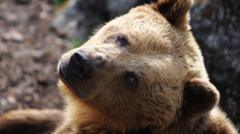In a surprising move, Slovakia's populist government has approved the sale of brown bear meat to the public, despite the species' protected status under EU law. Last month, the cabinet took decisive action to address growing concerns about rising incidents of human-bear encounters, authorizing the shooting of approximately 350 out of the nation's estimated 1,300 brown bears. Critics, including conservationists and opposition politicians, have voiced strong objections to the plan, which they argue endangers this near-threatened species.
The government argues that the sale of culled bear meat is a necessary measure to prevent waste. State Minister Filip Kuffa highlighted that bear meat is edible and should not be discarded, stating, "We will release every shot animal that meets certain conditions for consumption." Effective next week, organizations under the environment ministry will be allowed to sell this meat, provided they comply with legal and hygiene requirements.
Bear-related incidents have been a rising political issue in Slovakia, largely following a tragic event in which a man was mauled to death while walking in a forest earlier this year. Prime Minister Robert Fico emphasized the need for action, stating, "We can't live in a country where people are afraid to go into the woods." The government claims that rising bear populations are directly linked to increased incidents, with Slovakia experiencing 54 bear attacks from 2000 to 2020.
Opponents of the culling plan, like ecologist Michal Wiezik from the opposition party Progressive Slovakia, criticize the government's approach as misguided, contending that the focus should shift to preventive measures rather than lethal actions. Environmental advocates, including Miroslava Abelova from Greenpeace Slovakia, have condemned the cull as "completely reckless," arguing it dismisses conservation laws and scientific counsel.
Brown bear meat is not commonly consumed in Europe, noted primarily as a delicacy in certain areas such as parts of Eastern Europe and the Nordic countries. Its availability has been limited due to strict regulations concerning hunting and the status of the species. Moreover, public health officials warn that bear meat carries risks associated with Trichinella, a parasite that can lead to severe illness. According to EU food safety regulations, all bear meat must be tested for Trichinella larvae before it can be sold, with certain cooking standards required to ensure consumer safety.
As the situation develops, the implications of Slovakia's controversial decision on brown bear conservation and public safety remain to be seen.


















